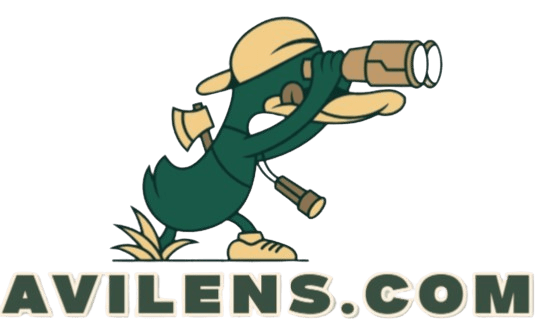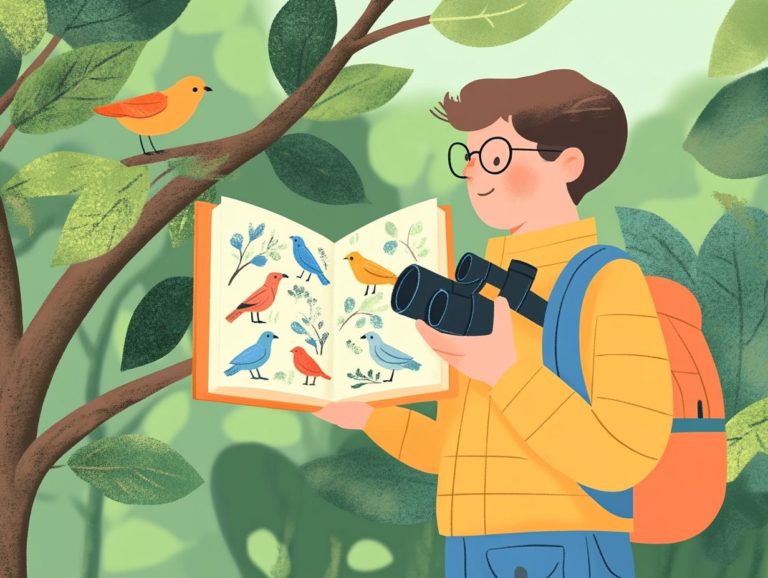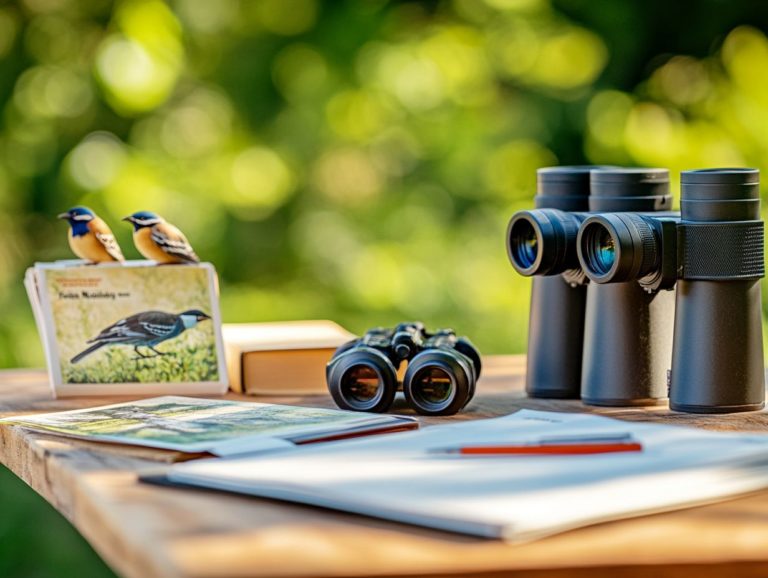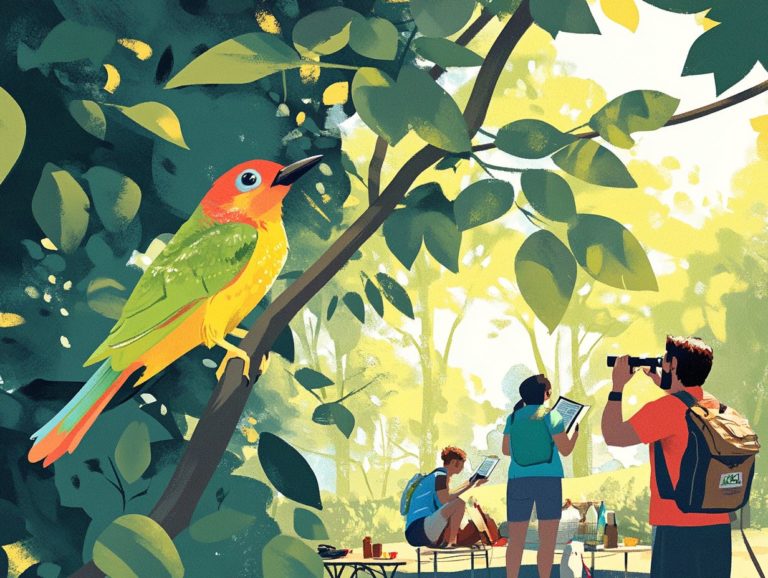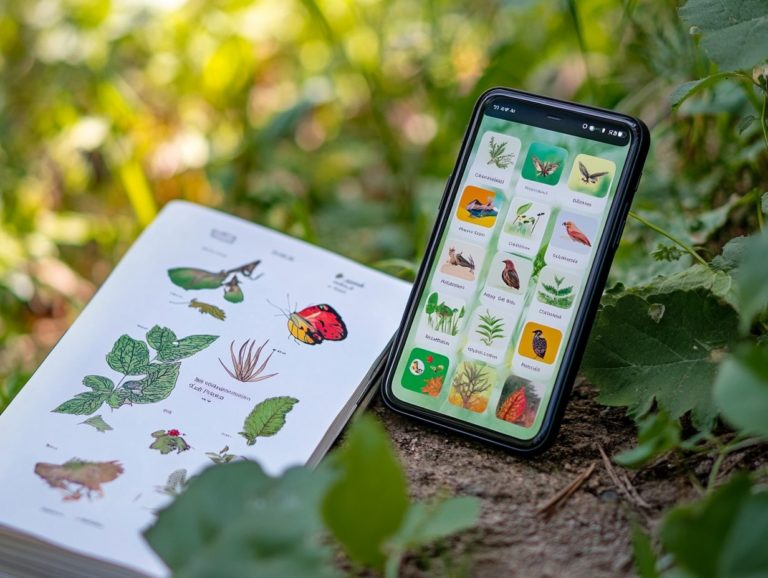Understanding Birdwatching Ethics with Field Guides
Birdwatching presents a remarkable opportunity for you to connect with nature and truly appreciate the beauty of avian life, including the art of bird photography.
It’s crucial to consider ethical practices to ensure that your passion for observing birds does not inadvertently harm their habitats or well-being.
This discussion delves into the significance of wildlife ethics in birdwatching, the role of field guides in enriching your experience, and the common ethical dilemmas you may encounter.
Discover exciting responsible birdwatching practices today, such as maintaining distance and avoiding disturbance. You will also find resources that will help you deepen your understanding of avian ethics.
Embrace the journey of enjoying birdwatching, including bird feeding, while becoming a mindful steward of the environment.
Contents
- Key Takeaways:
- The Role of Field Guides in Birdwatching
- Common Ethical Dilemmas in Birdwatching
- Practicing Responsible Birdwatching
- Resources for Learning More About Birdwatching Ethics
- Frequently Asked Questions
- What is birdwatching ethics and why is it important?
- How can I learn about birdwatching ethics?
- What are some key principles of birdwatching ethics?
- What should I do if I accidentally disturb a bird?
- Can I use field guides to identify and track bird behavior?
- How can I promote ethical birdwatching practices?
Key Takeaways:

- Understanding birdwatching ethics is crucial for protecting and preserving the well-being of birds and their nests and habitats.
- Field guides are helpful tools for identifying and observing birds, but they should be used responsibly and with respect for birds’ natural behavior and well-being.
- Practicing responsible birdwatching involves following key principles such as maintaining a safe distance and respecting private property, while avoiding disturbance to nesting birds.
Why Ethics are Important in Birdwatching
Ethics hold significant sway in the realm of birdwatching, guiding your behavior within the birders community and ensuring your actions do not disrupt the delicate ecosystems that birds call home. By embracing ethical practices such as respecting birds’ natural behaviors and maintaining a safe distance you can revel in the beauty of these avian species without causing unnecessary stress or disturbance.
These principles promote responsible birding and contribute to the conservation of bird habitats and the protection of nesting sites, fostering a harmonious relationship between humans and wildlife.
The importance of ethical birding practices transcends mere personal enjoyment. Research from esteemed organizations like Audubon highlights that responsible birdwatching can positively influence bird populations. Ethical birding reduces stress levels in birds, leading to healthier nesting outcomes and improved reproductive success.
Insights from wildlife ethics experts underscore that simple actions, like minimizing disturbances to nesting sites, can safeguard vital habitats for a multitude of species.
As a birder who adheres to ethical guidelines, you ll find your wildlife photography experiences greatly enhanced. Careful observation of birds in their natural habitats often results in breathtaking captures. This mindful approach not only enriches your individual experiences but also fosters a sense of community among birders, as shared values around conservation inspire collaboration and the exchange of knowledge.
The Role of Field Guides in Birdwatching
Field guides are invaluable resources for you as a birdwatcher, allowing you to identify and observe a variety of bird species with ease while promoting ethical birding practices.
These guides offer not just detailed illustrations and descriptions of birds, but also essential insights into their natural habitats, behaviors, and calls. By utilizing field guides, you can elevate your birdwatching experience with the knowledge necessary to engage with avian life responsibly, including photography guidelines for capturing images.
This ensures that your interactions are mindful, avoiding any disturbance to nesting birds or unnecessary stress on wildlife.
Start your birdwatching adventure today and become a wildlife ambassador!
How Field Guides Help Identify and Observe Birds
Field guides are your go-to companions for birdwatching. They provide a wealth of information for identifying birds and offer visual cues and insights into bird calls. This enhances your observation skills.
By utilizing these invaluable resources, you can truly appreciate and connect with the diverse habitats of various bird species. You can do this while adhering to ethical practices that minimize disturbance to both the birds and their environments.
Beyond their stunning illustrations that capture the intricate details of feathers and markings, these guides often include descriptions that reveal each species’ behavior and habitat preferences. Many even feature QR codes or links to audio clips of bird calls.
This elevates your experience and helps you recognize the delightful sounds of the avian world. Such comprehensive resources encourage a deeper understanding of bird ecology and promote responsible practices that prioritize the well-being of birds in their natural habitats.
By nurturing a respectful relationship with nature, you not only enrich your birdwatching adventures but also play a vital role in the conservation of these remarkable creatures.
Common Ethical Dilemmas in Birdwatching
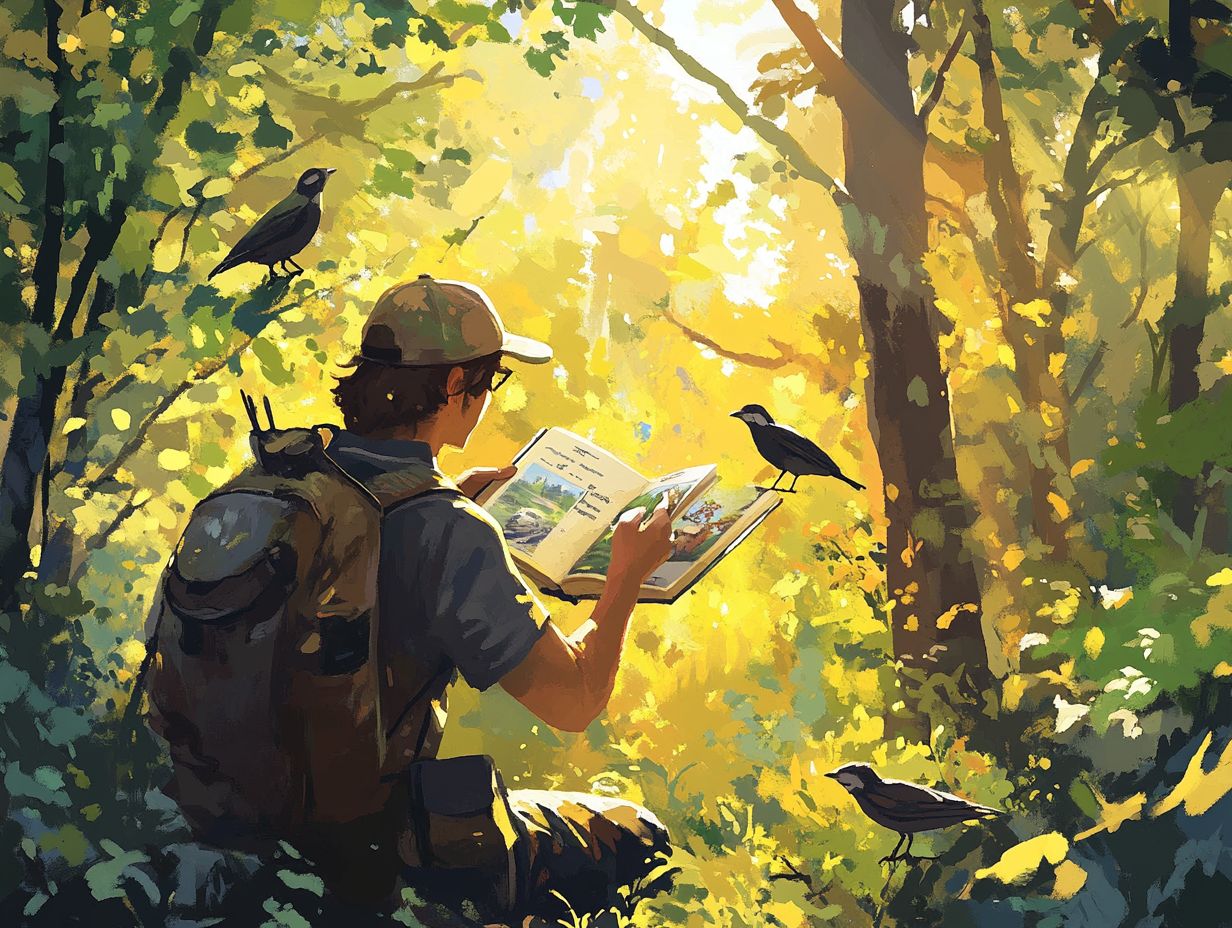
As birdwatching continues to soar in popularity, you might face some tough choices about how to enjoy birdwatching without harming the birds. Ethical dilemmas challenge you to harmonize your passion for wildlife with the responsibility of protecting bird habitats and species.
Issues like disturbing nesting birds or encroaching on delicate habitats can create conflicts. This highlights the importance of thoughtful discussions about wildlife ethics in the birding community.
By developing guidelines that promote ethical birding practices, you strengthen the community. You also pave the way for the sustainable enjoyment of birdwatching for generations to come.
Habitat Disturbance and Nesting Birds
Habitat disturbance presents a significant threat to nesting birds. Human activities can disrupt their natural behaviors, leading to increased stress, abandonment of nests, and decreased reproductive success.
As a birder, it s essential for you to remain vigilant, especially during breeding seasons when these birds are particularly vulnerable. Disturbances can take many forms whether it s off-trail hiking, loud noises, or getting too close with a camera.
For example, simply walking nearer to a nest for a better view can prompt birds to abandon their eggs or young chicks. The repercussions can ripple through local ecosystems, diminishing bird populations and disrupting the delicate balance of species in the area.
This impact can affect shorebirds, seabirds, and other dependent species. Act now! Maintain a safe distance and stick to designated paths to protect nesting birds.
Also, be attuned to signs of stress in birds, such as erratic flight patterns or alarm calls. By prioritizing respectful wildlife observation, you enhance your own experience while playing a crucial role in protecting these remarkable creatures.
Interacting with Other Birdwatchers and Non-birders
Interactions between birdwatchers and non-birders play a crucial role in shaping the overall birdwatching experience. This underscores the significance of birding etiquette and ethical practices within the community.
By nurturing positive relationships and sharing insights, you elevate the understanding of wildlife conservation. You can foster respect for birds and encourage responsible behavior among all observers.
These constructive interactions create a welcome atmosphere for newcomers while highlighting the importance of respectful communication. By actively sharing ethical principles, you help non-birders appreciate these magnificent creatures.
This collaborative spirit cultivates a shared dedication to conservation efforts. It ensures that both groups recognize their collective responsibility in protecting natural habitats.
Ultimately, these connections can lead to increased advocacy for bird-friendly practices and support for initiatives that safeguard vital ecosystems.
Practicing Responsible Birdwatching
Practicing responsible birdwatching is crucial for preserving bird habitats and ensuring the well-being of bird species while enjoying your wildlife photography and observation.
By adhering to ethical practices, you can minimize your impact on natural environments, maintain a respectful distance from birds, and avoid disturbing them during critical periods like nesting seasons.
Embracing these principles not only enriches your birdwatching experience but also cultivates a culture of respect within the birding community.
Key Principles to Follow

The key principles of responsible birdwatching hinge on your commitment to wildlife ethics and the practice of ethical birding techniques that prioritize the well-being of birds and their habitats. Dive into your passion for birdwatching while preserving the delicate balance of the natural environments you cherish.
Understanding stress signals in birds like rapid wing flapping or distinctive vocalizations is essential for nurturing a harmonious relationship with wildlife. When you show respect for sensitive habitats, such as wetlands and nesting areas, you actively contribute to healthier bird populations and foster more sustainable birding experiences.
For example, choosing to observe birds from a distance not only minimizes their stress but also allows them to engage in uninterrupted feeding and breeding behaviors. Following these ethical practices makes the birdwatching environment better for everyone, amplifying the shared appreciation for avian diversity and inspiring others to embrace responsible techniques.
Resources for Learning More About Birdwatching Ethics
Finding the right resources deepens your understanding of birdwatching ethics. This knowledge gives you the power to engage responsibly with wildlife and champion sustainable practices within your community.
A curated selection of recommended books and websites provides invaluable insights into ethical birding practices, guiding you through the intricacies of wildlife observation while nurturing a profound respect for birds and their habitats.
Recommended Books and Websites
This curated selection of recommended books and websites stands as an invaluable resource for you as a birdwatcher eager to deepen your understanding of birdwatching ethics and responsible practices within the birding community. These materials unlock valuable insights into ethical birding, habitat conservation, and the critical importance of respecting wildlife ensuring a sustainable future for bird species.
For instance, titles like “The Birdwatcher’s Guide to Ethics” deliver a thorough examination of best practices, while platforms such as the American Birding Association provide essential guidelines on responsible birding techniques. Resources like “Birding for All” emphasize inclusivity and environmental stewardship, making them critical references. Delving into these works not only enhances your ethical awareness but also invites you to engage in meaningful discussions about conservation.
By utilizing these enriching materials, you can contribute positively to the community and foster sustainable interactions with nature. Start your journey into responsible birdwatching today!
Frequently Asked Questions
What is birdwatching ethics and why is it important?
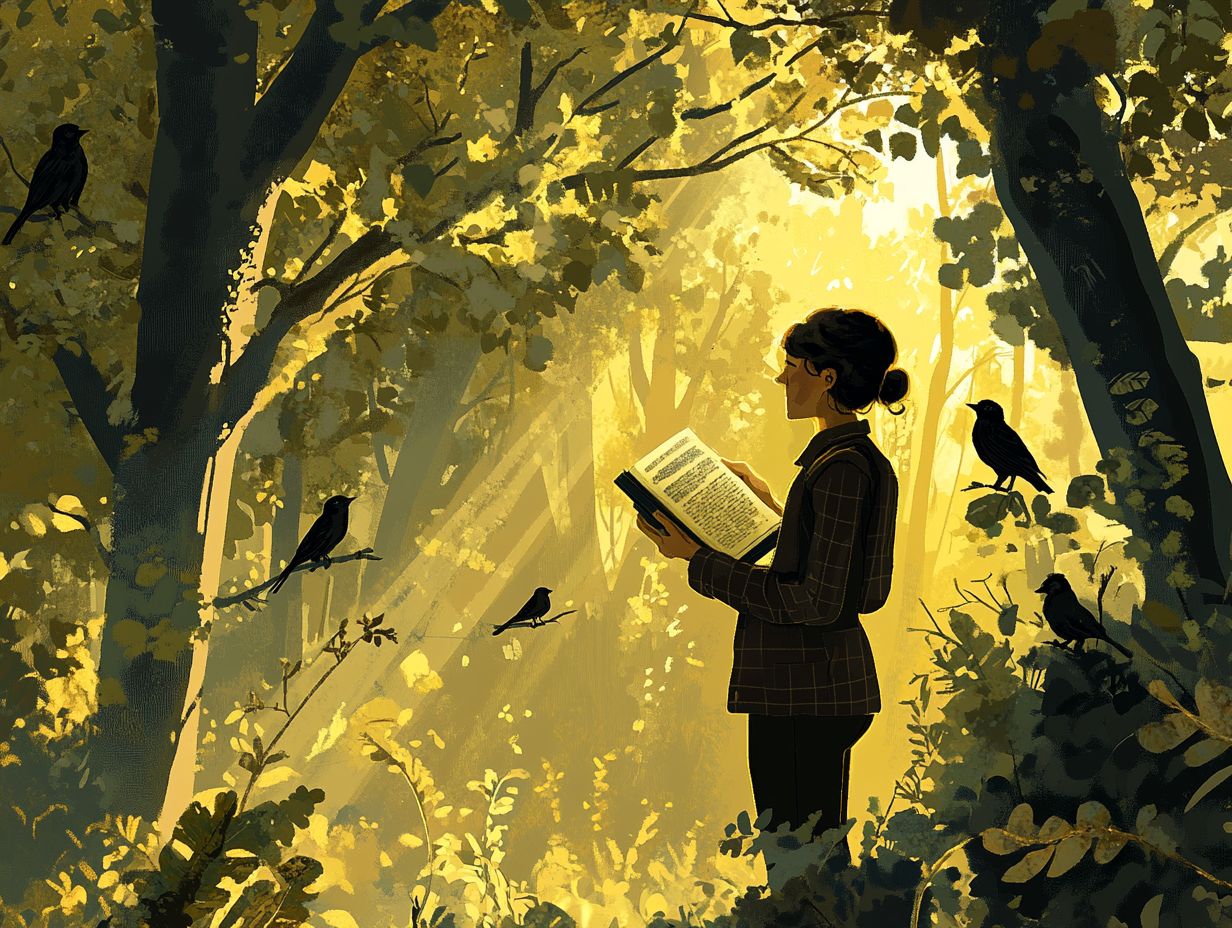
Birdwatching ethics refers to a set of guidelines and principles that aim to promote responsible and ethical behavior while observing and studying birds in their natural habitats. It is important because it helps protect birds and their habitats, promotes sustainable birdwatching practices, and ensures a positive experience for both birds and birdwatchers.
How can I learn about birdwatching ethics?
One of the best ways to learn about birdwatching ethics is through field guides. These guides provide valuable information on proper birdwatching etiquette, conservation principles, and ethical considerations for birdwatching activities.
What are some key principles of birdwatching ethics?
Respecting birds and their habitats is essential. Avoid disturbing them, follow local rules, and share information responsibly.
What should I do if I accidentally disturb a bird?
If you disturb a bird, move away quietly to give it space. Keep a safe distance, especially from nesting birds.
Can I use field guides to identify and track bird behavior?
Yes! Field guides are excellent for spotting birds and understanding their behaviors. Just remember to observe without causing harm.
How can I promote ethical birdwatching practices?
Set a good example by following ethical guidelines. Educate others, support conservation efforts, and report any unethical behavior to the proper authorities.
Join the movement for ethical birdwatching today!
